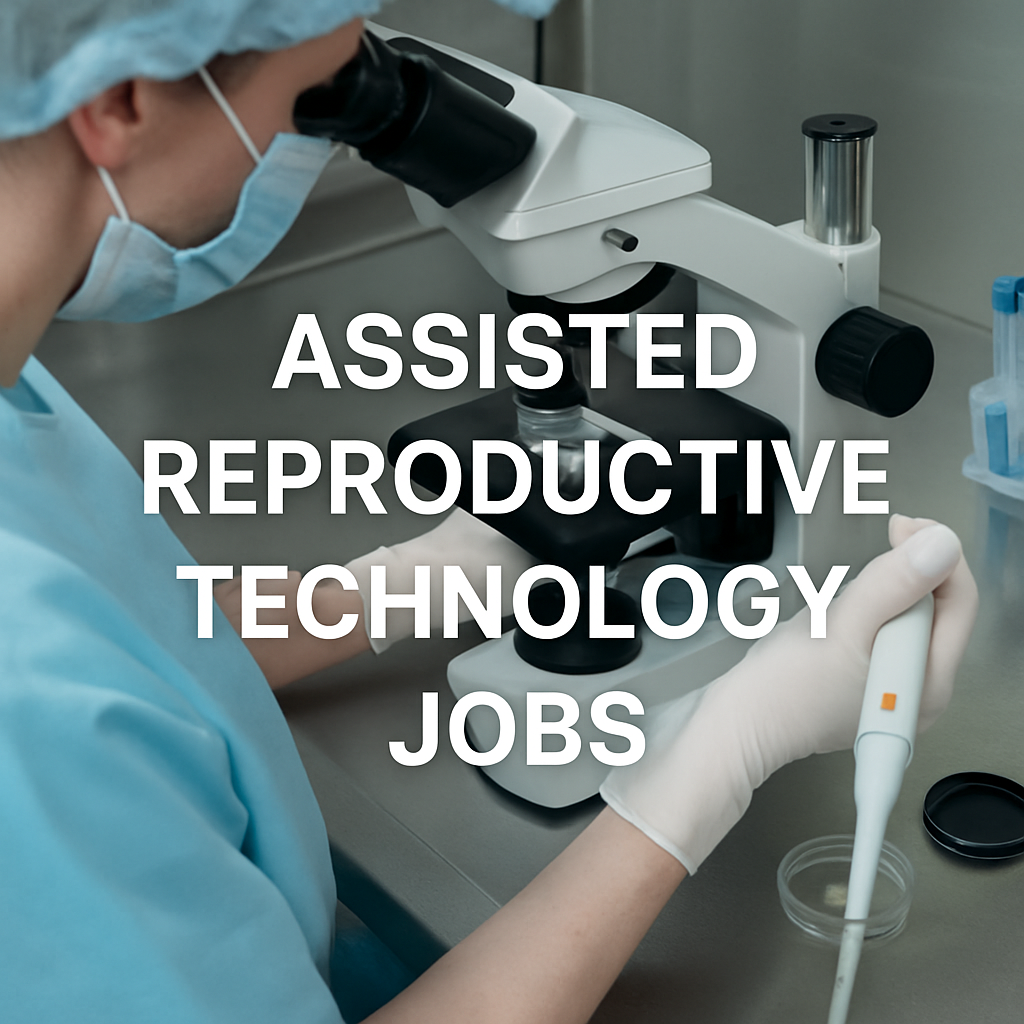Introduction
The increasing use of ART in the current high paced medical world means that Assisted Reproductive Technology (ART) jobs are on the increase. The number of Assisted Reproductive Technology (ART) jobs professionals interested in practicing rewarding careers is increasing as the negative fertility rates steadily drop and the need of reproductive assistance increases worldwide. This industry involves in-vitro fertilization (IVF), sperm and egg donation, embryo freezing among other fertility services. It blends compassionate patient care, technology, and science, which is why it is a perfect profession to pursue when one is passionate about assisting people to have families.
Assisted Reproductive Technology (ART) jobs has much to offer be it a student who wishes to pursue a healthcare career or a professional embarking on a career change into a meaningful profession. This guide will examine the best careers, education requirements, employment prospects, and skills that one requires to excel in this radical field. Throughout, you will understand fully how to start or upgrade your career in assisted reproductive technology.
What Does Assisted Reproductive Technology (ART) Mean?
Assisted Reproductive Technology (ART) jobs is a medical method of ensuring that people conceive kids. They are employed commonly when natural conception proves to be hard or impracticable.
Major ART procedures are:
In-Vitro Fertilization (IVF): Eggs are crossed in a test tube with sperm.
Intracytoplasmic Sperm Injection (ICSI): One of the sperm is placed directly into an egg.
Donor Sperm/Eggs: Sperm or egg of a donor will be used.
Surrogacy: A lady gives birth to a baby on behalf of another person.
Cryopreservation: Egg freezing, sperm freezing or embryonic freezing.
Why ART:
Resolves infertility to many all over the world.
Lauds LGBTQ+ families.
Allows people to postpone child bearing due to personal or health reasons.
With the development of the field, more jobs are opening up as more than mere scientists specialized in the field are needed to cope with the process not only on a scientific level but also an emotional one of patients.
Best jobs in Assisted Reproductive Technology
There are numerous fields of studies in which an ART job can be applied, including: work in the laboratory, as a counselor to the patients. Every role has an important role to play to assist patients in attaining parenthood.
A majority of marketable careers in ART:
Embryologist: Processes eggs, sperm and embryos in the incubator.
Reproductive Endocrinologist Obstetrics/Gynecologic specialist that is trained in endocrinology and fertility.
Fertility Nurse: Patient care and assist in procedures.
Andrologies: It deals with male fertility and steric analysis.
Genetic Counselor: Educates patients about hereditary dangers and testing.
Patient Coordinator: Coordinates patients with medical groups.
Cryopreservation Specialist: In charge of the tissue (reproductive) storage.
Emerging roles:
Analysts In Fertility Informatics
Reproductive Psychologists
ART ART(AI) Specialists
The work in these professions is very satisfying and has the potential of making a mark in the world.
Educational Prerequisites and Credentials
Certain educational courses and certificating may be required to work in the field of ART.
Overall requirements:
Embryologist: bachelors degree in biology or life sciences with a preference of master or PhD.
Reproductive Endocrinologist: MD and Residency in OB/GYN and pass REI.
Fertility Nurse: must have RN license; preferably has fertility nursing certification.
Genetic Counselor: Master degree, genetic counseling; board-certified.
Common certifications:
The American Board of Bioanalysis (ABB): To be an embryologist or a laboratory director.
ASRM Certificate Courses: Train to specialize in a range of ART.
CCRN (or RNC-OB): In case of nurses.
Continued education plays a crucial part in this changing world to keep pace with emerging technology and practices.
kills and characters of ART professionals
A career in the field of assisted reproductive technology, is a profession that requires a distinct combination of science, technical competency and emotional insight.
Must-have skills:
Detail-Oriented: Particularly in laboratory-based work (such as in embryology).
Empathy/Communication: Essential to nurses and patient coordinators.
Analytical Thinking: It is necessary to be able to interpret the results of the laboratory and streamline the process.
Changeability: New methods come up every now and then.
Teamwork: Interdisciplinary work is the order.
Successful traits:
Patience
Discretion
Compassion
Ethical sensitivity
The combination of these soft and hard skills is both clinically successful and with positive patient experience.
Work conditions and everyday duties Work Environment and Daily Responsibilities
There are various places in which the professionals in the fields of ART operate that are associated with certain requirements.
Common workplaces:
Fertility clinics
Hospitals
Educational institutions of research
Sperm and egg banks
Surrogacy agencies
Common per role work:
Embryologist: Egg extraction, IVF processes and embryo growth.
Fertility Nurse: Patient education, providing medication, getting ready procedures.
Patient Coordinator: Appointment making, answering queries, emotional support.
Working hours:
May incorporate weekend, holidays or morning shifts based on the time of treatment.
Certain positions have the flex or telehealth.
Job table example:
| Role | Setting | Average Salary (US) | Work Schedule |
|---|---|---|---|
| Embryologist | Lab/Clinic | $70,000 – $100,000 | Full-time, shift |
| Fertility Nurse | Clinic/Hospital | $60,000 – $90,000 | Full-time/part-time |
| Genetic Counselor | Clinic/Telehealth | $80,000 – $110,000 | Office hours |
Wages/Remuneration and Advancement.
Salaries with ART careers are based on education, experience and the geographical location.
Approximate pay rates:
Embryologist: 70000 -100000
Reproductive Endocrinologist: 250,000 – 400,000+
Fertility Nurse: 60-90 thousand dollars
Salary of Genetic Counselor: 80-110 K
Cryopreservation Technician: 50,000- 75,000
Issues that affect wages:
The size and reputation of clinic
Geographic location
Experience is age-old
Specialized certifications
Careers and career lines:
Director of the Labs (embryologists)
Nurse Manager
Clinical Researcher
Academic Faculty
There is a developing industry and well trained individuals are highly requested.
The place of a technology in ART careers
Assisted reproductive technology is innovated with the aid of technology.
ART techs in the labs:
Disposable time-lapse embryo monitoring systems
Embryo selection algorithms with use of AI.
Egg and sperm architecting through robotic pipetting
ONCs systems Digital patient tracking
Emerging trends:
Fertility predictions with AI and machine learning
Blockchain in security of donor and patient records
Ovulation tracking and Telehealth mobile app
It is important to remain technologically up to date in order to be successful in ART careers in the long-term perspective.
Moral Issues in Artistic Fields
The professionals of the field of Assisted Reproductive Technology (ART) jobs are forced to operate within the precarious ethical terrain.
Typical moral issues:
Ownership conflicts of embryos
Donor anonymity
Age and eligibility to ART services
The way professionals deal with ethics:
Adhere to ASRM (American Society for Reproductive Medicine) suggestions
Enter ethics committees
Be open with the patient.
In many instances, certification and continuing education involves ethics training.
Success Stories and Real Life Case Studies
Case study 1 Lab innovation in IVF success rates
One of the clinics in California adopted the AI-enabled embryo grading practice that enhanced the success rates in IVF by 18 percent in six months. The embryologists and the data analysts did work together to maximize patient outcomes.
The impact of patient coordinator: Case study 2
This intervention was carried out in a New York clinic and involved introducing a bilingual patient coordinator who aided in an engagement of Hispanic patients by 40% and this increased patient trust and satisfaction.
Success Story:
Dr. Anita Rao is a reproductive endocrinologist who moved on to Assisted Reproductive Technology (ART) jobs following the life-altering effect of IVF. Her clinic currently serves more than 1,000 couples a year.
The Way to Enter an ART Career
Are you ready to plunge to the world of ART? To do that follow the following steps:
Decide on your career direction: Are you inclined to clinical, lab or administrative career?
Seek an education: Get the degrees or certifications that apply.
Get experience: Become intern or volunteer in fertility clinics.
Network: Visit ASRM conferences, participate in LinkedIn groups.
Remain up-to-date: Take a subscription to journals such as fertility and sterility.
Recommended resources:
ASRM.org
ReproductiveFacts.org
EmbryologyAcademy.org
Your experience as an Assisted Reproductive Technology (ART) jobs patient might give a new birth-literally.
FAQS on Assisted Reproductive Technology Jobs
Do I have to be medically trained to work in ART?
Not necessarily. Other occupations such as embryology or coordination only necessitate qualifying science degrees or certifications.
What are the forecasts of professionals in ART employment?
The prospects are quite bright, as the fertility services market in the world will continue expanding in the future significantly within the following decade.
How am I able to work in ART when I am a psychologist?
Yes. Psychological support and fertility counseling are essential to the care of patients.
Does ART work get stressful?
There are emotional aspects of some roles, yet most professionals say that the work is very rewarding.
What are the ways of specializing in ART?
Superior certifications and subspecialty training in subjects such as DNA knowledge, cryopreservation or fertility nursing may aid.
Conclusion
The Assisted Reproductive Technology (ART) jobs careers provide thriving fusion of technical creativity, tender compassion as well as life-changing influence. No matter what attracts you, whether it is the precision of laboratory work or the patient interaction or the leading edge of fertility technology, there is a place you belong to this exciting industry. With continued increase in demand across the globe, opportunities or chances of meaningful, stable and fulfilling careers also keep rising.
Gathering the necessary education, certifications, and attitude, you will be able to take a step that will not only improve your own career but also transform the lives of so many people by giving them the possibilities to become parents of their own children. Find out, connect and make that first step into a future that you can realize in assisted reproductive technology today.







1 thought on “Assisted Reproductive Technology (ART) jobs”